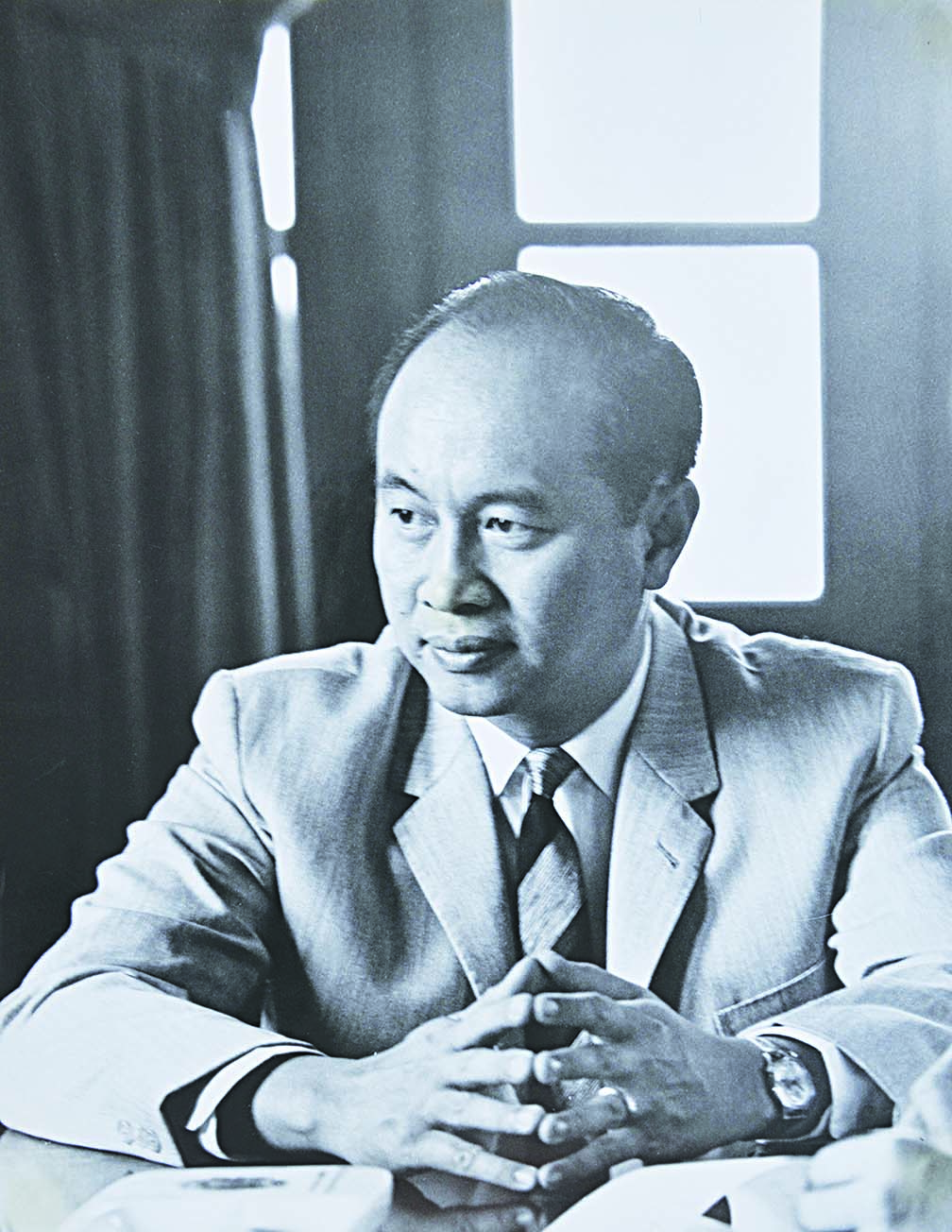The Commission on Population and Development (POPCOM) has been generating interest on the life and times of the late Rafael “Paeng” M. Salas, first executive director of the United Nations Fund for Population Activities (UNFPA) and creator of the first population program of the world.
In 2019, it published his biography, A Millenial for Others: The Life & Times of Rafael M. Salas, co-authored by Jose Y. Dalisay, Jr. and Carmen Sarmiento.
History has shown how the Bago, Negros Occidental-born Salas, known as “Mr. Population,” succeeded in his job in the Global Village, promoting responsible parenthood and healthful practice in fertility and reproduction which in the long term would have good effects on the population.
World population today has crossed 7.8 billion. The Philippine population currently stands at 108,658,985 with China topping the list at 1.4 billion, followed by India at 1.3 billion and the United States a far third at 332.5 million.
The Philippine population is the 12th largest in the world and 7th in Asia with a 1.41% share in the world’s total.
Paeng Salas figured prominently when he walked out of his job at the Malacañang Palace as Executive Secretary, which wasn’t only prestigious but also vested in him vast powers that made him primus inter pares or first among equals.
The baby boomers back then, born between 1946 and 1964, were both shocked and surprised why Salas relinquished his post without being told to do so and flew to New York with wife Menchu (the former Carmen Rodriguez) on July 25, 1969 amid uncertainties.
In an interview, he told Nick Joaquin who was to write a book, The World of Rafael Salas: Service and Management in the Global Village, “By the very act of departing for New York, I was leaving behind nearly four years in one of the most influential Cabinet posts in the Philippine government: That of Executive Secretary. By the same act, I was accepting an invitation which Paul G. Hoffman, then administrator of the United Nations Development Program, had generously extended to me some months earlier to head a new United Nations action program in population—later to be named the United Nations Fund for Population Activities (UNFPA).”
All he knew was that he was to be a “senior consultant” to the UNFPA administrator.
BRILLIANT MIND

Paeng was extraordinary. He was an outstanding student. In one grading period he got straight 1s, the highest possible score a student could earn at the U.P. He was always an honor student, except in his last year in law school. He graduated magna cum laude in his A.B. and cum laude in his Ll.B.
Former Senator Juan Ponce Enrile who looked up at Paeng as a “father figure” recalled that “Salas, the student had not only a ‘brilliant’ mind but also a ‘photographic’ memory.”
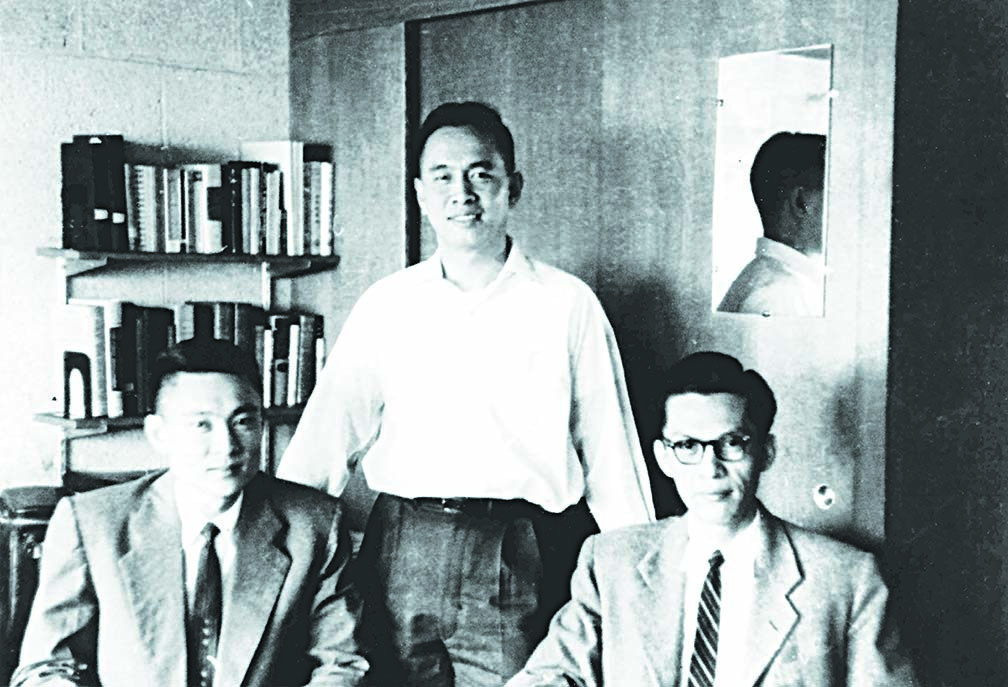
“He would walk into class and take the exam without any preparation whatsoever, something I did not dare do, and he would still top the class. During our freshman and sophomore years, Paeng was at the head of our class but dropped behind as he became more engrossed in campus politics and national student activities. However, his brilliance of mind was a fact conceded by his classmates and most of us agreed that, were it not for his extra-curricular activities, he could have easily graduated at the top of his class,” Enrile told Nick Joaquin.
Paeng Salas was a wunderkind wearing many hats: Chairman of the revision committee for the Revised Administrative Code, Executive Officer of the erstwhile moribund Rice and Corn Coordinating Council (RCPCC), University professor, among others, in addition to his being the Executive Secretary.
He was working hard, putting in 18 hours on the job to serve the country during the first term of Marcos.
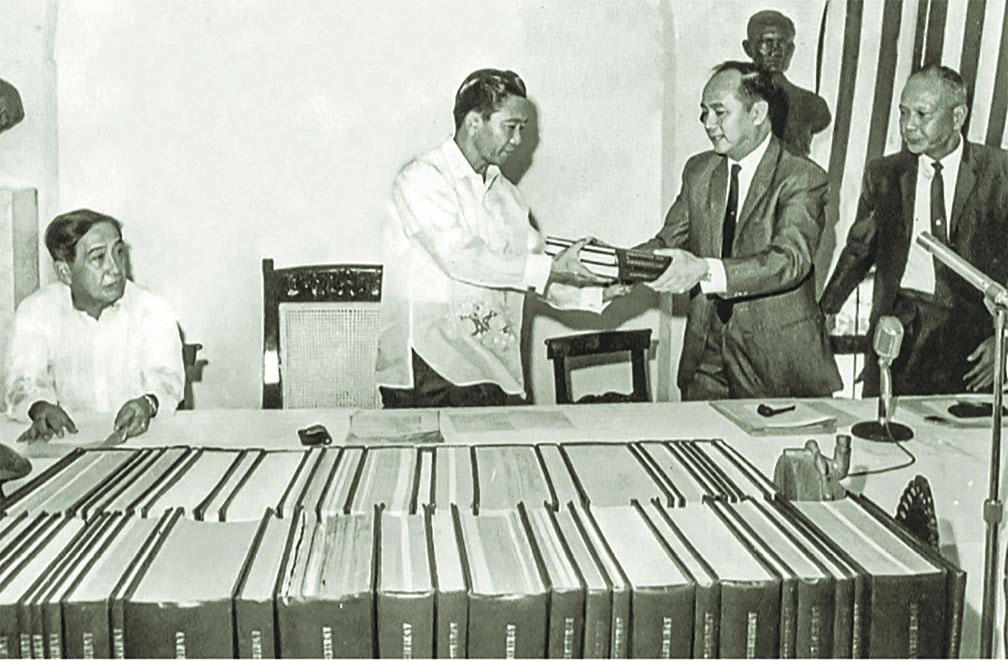
“Salas was quoted as saying he only wanted to serve for one year and to last up to 1969 was already a tribute to his enduring desire to serve the country,” Undersecretary and POPCOM Executive Director Juan Antonio A. Perez III said.
At that time, Salas could have seen the dictatorial tendency of the regime.
Salas’ work ethic could have been contributory to the fatal heart attack that snuffed out his life at a young age of 59 on March 4, 1987.
FRENETIC PACE
The frenetic pace with which he carried out his job could be gleaned from an interview in Hong Kong for a Manila magazine when he had been managing the UNFPA for some two years.
Nick Joaquin wrote,” The interviewer could have got jet lag just listening to his (Salas’) odysseys.”
“Today, he’s in Hong Kong, on his way to India; yesterday he was in Jakarta; the day before, in Bangkok. The jet pace in no way burns in his manner, still the mellow of cool, nor in his voice, where the South yet accents the unhurried words. He is going on 43, still lean of face and figure, translucent of skin. The receding hairline has now retreated past the forehead: hope is a strip of tape nursing a graft of growth. Otherwise, Paeng Salas hardly looks a day older since the afternoon he made headlines by walking out on the Palace,” Nick Joaquin said.

Paeng had become one of the most powerful men of the world, if among the least-known of those who can really exert a global influence. As a director of the Population Commission of the United Nations, he was solely in charge of the UN Fund for Population Activities.
In administering the fund, he dealt directly and personally with governments on one hand, getting the “have nations” to contribute to the fund; on the other hand, he responded to requests for aid from “have not” nations.
When he took over the UNFPA, only two and a half million remained of the five million dollars subscribed by nine governments to the UNFPA.
Said Salas during the 1971 interview in Hong Kong, “In one year, I was able to increase the fund to 15 million. That record has not been equaled in the UN system. And from 15 million, we went up to 20 million by the end of 1970. The fund may be 44 million by the end of this year. I will collect 24 million this year alone—which is 10 times the two and a half million dollars I found when I came in.”
Actually, the end of 1971 found UNFPA resources jumping to the cumulative level of 48 million dollars, and to match the magnitude of those resources, Paeng Salas was raised to the rank of Assistant Secretary General.
Moreover, with assured contributions in 1973 totaling over 120 million dollars, Paeng Salas was elevated to the position of Undersecretary General, a rank only one step below that of the Secretary General of the United Nations.
DIPLOMATIC AGILITY
The UNFPA had been predicted not to last long because the Catholics and Communists were against it. That it has not only survived but flourished, observers said, was due to the “diplomatic agility” of Rafael Salas who never missed the chance to explain to objectors that the UNFPA is not exclusively devoted to birth control.
He said that it was just concerned with the problem of sterility as well as proper child rearing, with the improvement of maternity hospitals, and with census projects.
“Indeed, the UNFPA has concerns wholly unrelated to reproduction. Its special projects are dedicated to tackling the problems of women (sexism in the office and unfair wage scales); of the youth (alienation from the Establishment and resort to drugs); and of urbanization (the spread of the city into the countryside; and the influx of the peasantry into urban slum areas),” said Nick Joaquin.
Moreover, as Paeng Salas had so often pointed out, each country saw its population situation in its own manner.
“So, there is no single formula that all can follow. In Asia, for instance, over 60% of the Fund’s support is for family planning and related activities while in Africa, the United Republic of Cameroon, has received assistance with programs to find the medical causes of infertility and subfertility,” he said.
His campaign to break down prejudices against the UNFPA has been successful enough to win the Fund entry into the three sectors that opposed it: Catholic countries, Socialist countries and Arab countries.
Rejecting abortion, the UNFPA has become acceptable in Catholic countries, where it chiefly subsidizes the natural birth control methods approved by the Church.
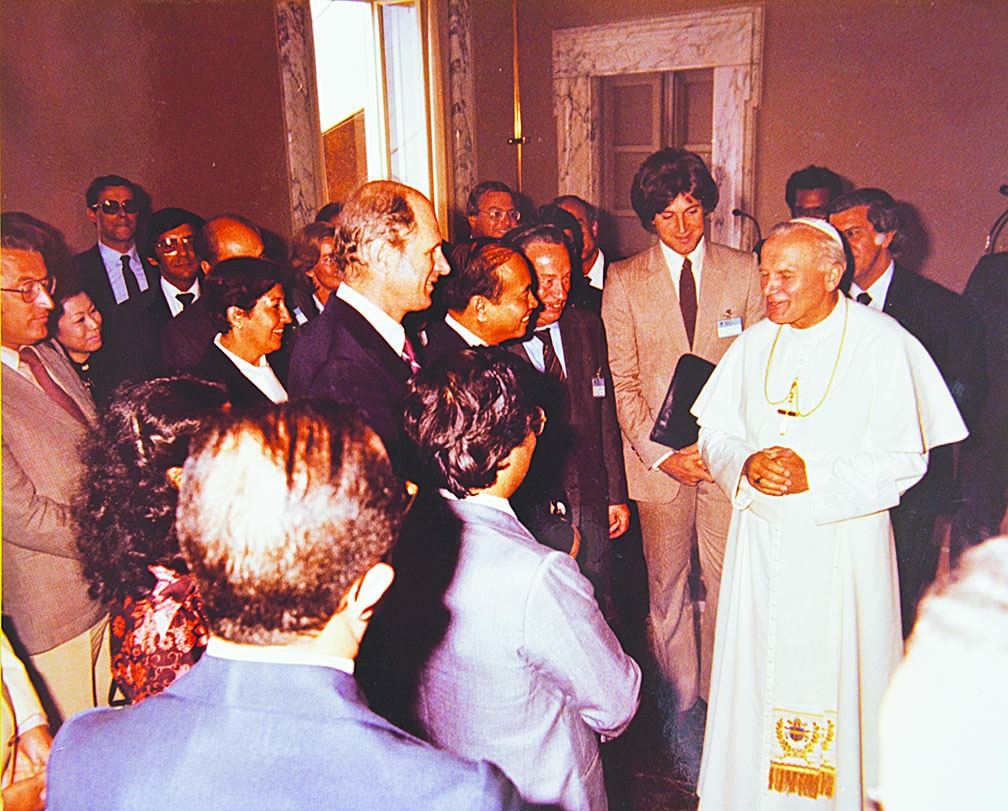
In 1974, then the father of one son, Paeng Salas, a Catholic, had an audience with Pope Paul II and they conversed on the scope of the UNFPA work.
In parting, the Pope extended a blessing to Salas, his wife and their son—as well as “to your future children.”
Also cooperative with the UNFPA are the so-called Iron Curtain cultures, once so suspicious of it until they found it could help them advance their own demographic studies and techniques. Hungary, Romania and Yugoslavia were the early participants.
FAST WORKER
By 1977, the Soviet Union was playing an active role in the UNFPA. Today, the Fund assists population programs on all communist and socialist countries, including Albania and in this “Red world, the emphasis on the relationship between population and economic development and on the role of women in society has considered the general concept of population.”
Such a concept was still beyond conjecture in the Arab world. When Salas met with the late King Khalid of Saudi Arabia, one of the monarch’s aides pointed out that, with a population of barely six million (at the time) and a territory nearly a third of the size of the United States, Saudi Arabia could hardly be fearing the so-called population bomb.

However, Salas pointed out in turn that the concept of “population” embraced not only the number of people living in a country but also how they were being provided for, how existing resources were being used in their favor, and what plans were being made for future growth.
During the heyday of Arab oil, Salas knew he was but one more in the queue of those asking for Arab contributions.
“I thought the thing to do when presenting the population case to Arab leaders was to confine the discussions to those parts of our work that were directly relevant to Arab states,” he said.
His skill as a fund-raiser was attested to by the swell of the Fund beyond the billion-dollar mark. Asked what accounted for it, he replied “Persistence and patience.” Then he added, “We have developed the credibility as an organization and we demonstrate this.”
More who knew him had a further explanation: Paeng was a fast worker.
MORE FUND-RAISING TRIPS
In 1985, he flew to Canberra to ask the Australians for an increase in their UNFPA contribution. He got it and was out by the next plane, leaving as fast as he came in. “When you’re pleading for money, you must not stay long,” he quipped.
Possibly his fastest coup was with then U.S. State Secretary Henry Kissinger, who, in exactly 20 minutes, was persuaded by Paeng to raise American aid to the UNFPA by two million dollars more.
“Such a speed in decision,” grinned Paeng, “is the formula I would like to see widely adopted.”
Time schedules on his fund-raising trips were usually very tight.
“In one particular case, I had a deadline to meet: attendance at the Arab League meeting in May 1975 and the Governing Council on June. I had therefore three weeks to visit eight countries. I made it as fast as we could by plane, car and jeep. To keep on schedule, I even rode over deserts and mountains in a small single engine plane where I was dumped in a tiny little seat together with all the luggage. I was uncomfortable all right but I made the deadline,” he said.
“Then there were the goofs,” Nick Jaoquin said. In one Arab land, because the terms for housing and population in Arabic, “iskan” and “sukkan,” are pronounced the same the host mistook him for the UN housing-project expert.
So, as Salas spoke on population, his beaming host understood him to be talking about housing.
“At another time, it took me almost 26 hours to reach the Middle East from Latin America. Tired and on the verge of catching a cold, I was informed upon my arrival that the airline had lost my baggage. I refused to get upset and went straight to my hotel. But I had not washed up when the telephone rang and I was told to be at the Palace within minutes. I had been wearing my clothes for almost two days… Attired this way, I was taken with great ceremony to my audience with the Head of State,” he said.
“In this magnificent Palace”, he said, “the conversation came out well and my host was apparently unconscious with my unconventional appearance.”
TOP U.N. POST
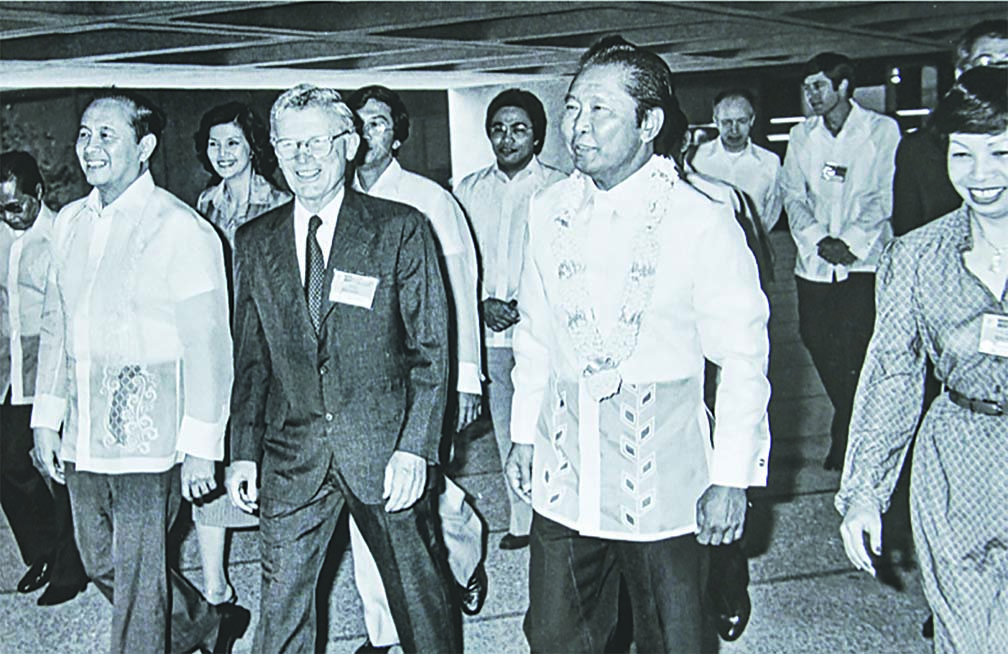
In 1981, Paeng Salas had the chance to make it to the room at the top of the U.N. totem pole. The elections for a new U.N. Secretary General had gone into a deadlock and a list of new candidates was announced. Paeng Salas was among the nominees. He got the news on December 9, 1981, while he was in Manila for the UNFPA conference on the scientific study of population.
“It was with happiness,” he said the press, “that I received word that I was among those being considered for the top U.N. post.”
But he said that he only had “a slim 15% chance of being elected”.
He might have had a greater chance than that if the Philippine government supported his candidacy.
But Malacañang refused to fight for Paeng and the Philippines missed the honor of having a native son as head of the Global Village.

